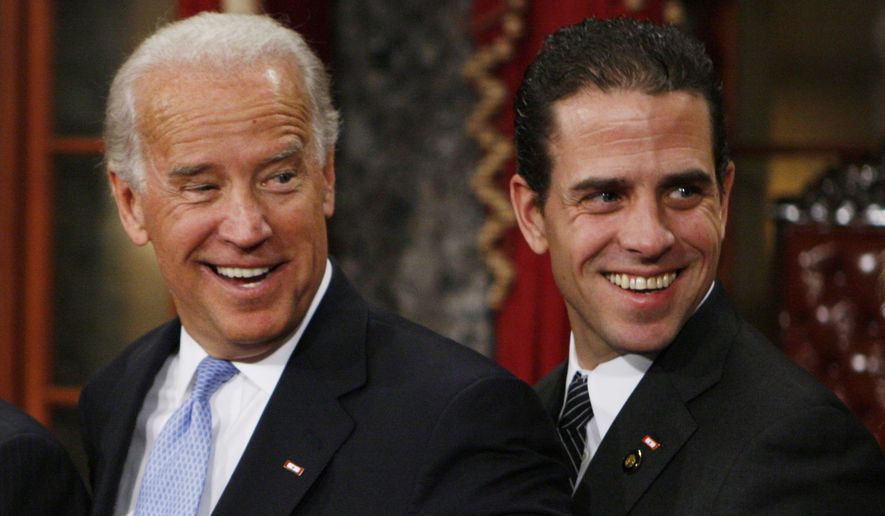President-elect Joseph R. Biden is promising to stay out of the federal investigation of his son Hunter Biden but will not pledge to protect the U.S. attorney leading the probe.
Incoming White House press secretary Jen Psaki on Sunday dodged questions about U.S. Attorney for Delaware David C. Weiss, who is leading the probe, keeping his job in the Biden administration.
“That’s a personnel decision. We are far from there at this point in the process, given we have not announced an attorney general, a commerce secretary, a labor secretary, an education secretary,” Ms. Psaki said on “Fox News Sunday.” “We’re going to allow the process to work how it should, which is for a Justice Department to be run independently by the attorney general at the top.”
She said Mr. Biden’s interviews of attorney general candidates will not include a discussion of the investigation of his son’s taxes and business dealings with China.
Accusations of nepotism, corruption and influence peddling have swirled around Hunter Biden since his father was vice president in the Obama administration. Mr. Weiss’ probe, which Hunter Biden acknowledged this month, is the first time the public has seen the feds go after him.
Republicans want Mr. Weiss shielded from being fired, but there is little they can do beyond marshaling public opinion in support of the probe.
GOP lawmakers also are pushing for a special counsel to handle the matter, which President Trump is considering as one of his final actions before leaving office Jan. 20.
“No matter how good Weiss may be and how much Weiss may be doing, if there is a shift in administrations, do you think Weiss and his subordinates would risk advancement by taking down the president’s son and brother and anyone else who may be implicated?” Rep. Andy Biggs, Arizona Republican, told The Washington Times.
When presidents assume office, they typically fire all of the U.S. attorneys appointed by their predecessor. Mr. Biden is expected to follow suit, which puts Mr. Weiss in the crosshairs.
In the past, Mr. Biden blasted Republican presidents who have fired U.S. attorneys amid politically sensitive investigations.
As a senator from Delaware, Mr. Biden criticized President George W. Bush for firing eight U.S. attorneys, calling it “highly, highly unusual.”
Yet he remained silent as vice president in 2009, when President Obama’s attorney general, Eric H. Holder Jr., replaced all of Mr. Bush’s U.S. attorneys.
In 1993, Mr. Biden defended President Clinton’s firing of U.S. attorneys appointed by President George H.W. Bush. One of the fired U.S. attorneys was overseeing a corruption probe targeting Rep. Dan Rostenkowski, Illinois Democrat.
Mr. Biden said there was no political influence on the investigations. A new U.S. attorney later finished the investigation into Rostenkowski, who served jail time for his crimes.
Still, some Republican senators say protecting Mr. Weiss is better than unleashing a special counsel.
“If Joe Biden is sworn in as president on Jan. 20, then those U.S. attorneys who are involved in this investigation, [and] their staff absolutely must stay on,” said Sen. Josh Hawley, Missouri Republican. “I mean, there can’t be any talk of replacing them or transitioning them. Anybody at the Department of Justice, main DOJ, who’s involved in this investigation must also be allowed to finish it and complete it. I mean, these are very serious allegations.”
One way or another, Republicans are scrambling to keep the Hunter Biden probe alive.
Ross Garber, who teaches political investigations and impeachment at Tulane University School of Law, doesn’t see much of a difference between keeping Mr. Weiss or appointing a special counsel because both will report to Mr. Biden’s handpicked attorney general.
“I think the calls for a special counsel are misguided,” Mr. Garber said. “There is a mistaken and naive belief that special counsels are independent. They are not.”
Mr. Biggs said the party is facing “enormous pressure to act now.”
If Republicans retain control of the Senate, which will be decided by two runoff elections in Georgia on Jan. 5, there would be little they could do to protect Mr. Weiss. U.S. attorneys serve at the pleasure of the president and can be fired at will.
Republicans would not be entirely powerless, however, if they retain the Senate. They could hold up the confirmation of Mr. Biden’s nomination for attorney general unless Mr. Weiss stays in his job.
A similar scenario played out during Watergate. President Nixon’s nominee for attorney general, Elliot Richardson, spent his confirmation hearing assuring senators that Watergate special prosecutor Archibald Cox would have full and independent control of the investigation.
“I would expect that before key Biden Justice Department positions are confirmed, the Senate is going to insist on satisfactory answers about how the Hunter Biden investigation is going to be handled,” Mr. Garber said.
Mr. Biden has pledged to stay out of the Justice Department’s affairs, repeatedly emphasizing the department’s independence to contrast himself with President Trump.
That was before Hunter Biden disclosed he was under investigation. Since then, Joseph R. Biden has been mostly mum on the matter, saying only he is “confident” his son was not involved in wrongdoing and he is “proud” of him.
Mr. Trump has been consulting advisers about potentially appointing a special counsel. That decision would typically be made by the attorney general.
With current Attorney General William Barr stepping down this week, all eyes will be on Acting Attorney General Jeffrey Rosen.
If Mr. Rosen refuses the request, Mr. Trump could fire him and appoint someone else to follow the order.
Mr. Trump took to Twitter last week to deny reports that he wants a special counsel, saying he has “nothing to do” with the case.
⦁ S.A. Miller contributed to this report.
• Jeff Mordock can be reached at jmordock@washingtontimes.com.




Please read our comment policy before commenting.